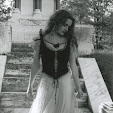Two more days until Readercon! Here's a look at where you can find me during the con.
Readercon 27 Schedule
Friday July 08
4:00 PM C Harry Potter Goes to Grad School and Gets a Job.
Jim Freund (leader), Max Gladstone, Josh Jasper, Ellen Kushner, E.J. Stevens.
Charlie Jane Anders's All the Birds in the Sky and Lev Grossman's The Magicians give us an unsentimental treatment of life after attending a magical school. As adults, many of us read and enjoyed Harry Potter, but its relevance to our day-to-day lives was not as great as for its target audience of school-age children. All the Birds in the Sky and The Magicians seem to fill that void, but with some interesting topical shifts. What further futures for magical students might we see?
6:00 PM E Autographs. Haris Durrani, E.J. Stevens.
**I will be signing and giving away FREE mini posters (BIRTHRIGHT and HOUND'S BITE) during my autograph hour. (While supplies last, so get there early!)**
Saturday July 09
10:00 AM 5 Instant Communication in Genre Fiction.
Nick Kaufmann, Thomas Olde Heuvelt (leader), Kit Reed, E.J. Stevens, Paul Tremblay.
In a 2015 interview on Atlas Obscura, R.L. Stine said, "Cell phones are the worst thing for writing horror. Cell phones ruin almost every plot." There are certainly a number of plots that rely on people being isolated and out of communication range, which is difficult to achieve these days. Other genres are influenced by pervasive interconnectedness: for example, fantasy novels often feature some sort of magical long-distance communication, perhaps because readers get impatient when characters have to wait a long time for news, and science fiction has tricorders and ansibles. How are genre writers working both with and against 21st-century reader assumptions around communication speed, expense, and accuracy?
1:00 PM 5 If Thor Can Hang Out with Iron Man, Why Can't Harry Dresden Use a Computer?
Gillian Daniels, Elaine Isaak, Andrea Phillips, Alex Shvartsman, E.J. Stevens.
In a series of tweets in 2015, Jared Axelrod pondered "the inherent weirdness of a superhero universe... where magic and science hold hands, where monsters stride over cities." This is only weird from the perspective of fantasy stories that set up magic and technology as incompatible, an opposition that parallels Western cultural splits between religion and science and between nature and industry. Harry Dresden's inability to touch a computer without damaging it is a direct descendant of the Ents destroying the "pits and forges" of Isengard, and a far cry from Thor, Iron Man, and the Scarlet Witch keeping company. What are the story benefits of setting up magic/nature/religion and technology/industry/science as either conflicting or complementary? What cultural anxieties are addressed by each choice? How are these elements handled in stories from various cultures and eras?
FAQs
- What: Readercon 27
- Where: Boston Marriott Quincy. Quincy, MA.
- When: July 7-10.
- Website: Readercon.org
Hope to see you at Readercon!



No comments:
Post a Comment